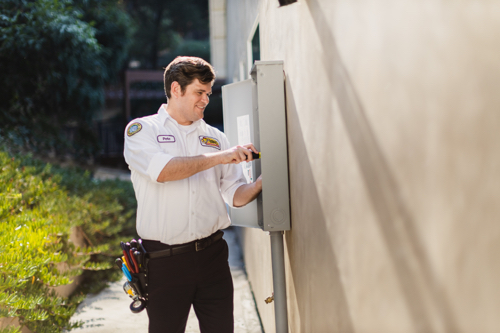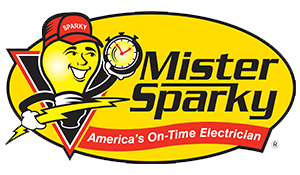Installing A Charging Station At A Condo
Owning an electric vehicle in Niceville, FL is a great way to live a more eco-friendly lifestyle. You’ll find public charging stations citywide, from 24/7 access points to hotel guest–only spots.
Some EV owners choose at-home charging by installing their own Level 2 EV charger. But for condo owners, at-home charging can present a few hurdles. You’ll have to get formal approval from your condo association board and meet all requirements relevant to Florida’s state statute §718.113(8).
Fortunately, with the right planning and an experienced electrician, you can complete the installation smoothly while staying fully compliant with local and state regulations.
Florida Law: Your Rights to Install Charging in Condo Parking
According to statute §718.113(8), condo owners can legally install an EV charging station, but it must be in their assigned parking space and comply with all safety, insurance, and aesthetic requirements. This means your condo association can’t deny you the ability to add a charger, but they can insist on certain power limits and installation methods. These rules welcome EV growth but defend the property’s integrity and design.
Key rights under Florida condo law:
- You may install a Level 1 or Level 2 EV charger in your designated parking space.
- You must pay for the equipment, installation, and ongoing electricity usage.
- You must maintain liability insurance covering the charging station.
- You must comply with all building codes and association requirements.
- You cannot install in common parking areas without board approval.
What Is a Limited Common Element and Why It Matters
The majority of condo parking spaces fall into the category of being a “limited common element.” This designation is particularly important because it determines your ability to modify the area. After all, even though you have rights, the property is technically owned by your condo association. And because of this, you may need to get certain permits before making alterations to install a charger. Finding out whether your parking space falls under the limited common element or private use category will clarify your approval process and help you avoid legal or procedural setbacks.
Approval process differences for limited common element vs private use:
- Ownership Rights – Association-owned vs. deeded.
- Board Approval Level – Full board vs. management.
- Permit Requirements – HOA and city vs. city only.
- Design Restrictions – Strict HOA guidelines vs. flexible.
- Insurance Coverage – HOA coverage vs. owner policy.
- Modification Limits – Stricter rules vs. more freedom.
- Approval Timeline – Longer process vs. faster.
Key Legal Requirements for Level 2 EV Charger Installation in Condos
Another one of the goals of statute §718.113(8) is to maintain community harmony among residents at your condo. EV chargers take up space and shared electrical capacity, which can translate into disputes with neighbors if you don’t follow association rules.
Core requirements for condo EV charger installation:
- Hire a licensed, insured electrician.
- Meet national and local codes.
- Carry insurance naming the association.
- Avoid damaging or blocking other spaces.
- Cover all equipment and installation costs.
Board Approval: What to Expect from Your Condo Association
The first step in adding a Level 2 EV charger to your condo is to present an installation plan to your condo board for approval. Submitting diagrams showcasing the proposed charger location, technical specifications, and proof of insurance are crucial requirements you must submit. You may also need a written agreement outlining your responsibilities for maintenance, removal, and repair if the charger ever needs to be taken out.
Steps to streamline board approval:
- Gather charger specifications and installation drawings from your electrician.
- Include proof of insurance that meets the board’s requirements.
- Be ready to explain how your installation won’t impact neighbors.
- Offer to schedule work during hours least disruptive to residents.
- Request that your electrician attend the board meeting for technical questions.
Architectural and Insurance Standards for Condo Installations
Most condo associations have strict standards in place regarding architectural design and aesthetics. These standards will dictate how to mount the charger, the color of conduit to use and how to enclose any exposed cables. Insurance requirements for condo EV chargers usually come in the form of liability coverage ($1 million or more), with a provision to name the association as an additional insured.
Metering, Billing & Cost Responsibility for Condo EV Chargers
When adding a charger to the parking lot of your condo, it will draw power from the building’s electrical system. This presents the question: who pays for the electricity? But Florida law is very clear—you must cover your own charging costs. To comply with this requirement, you must connect the charger to your individual unit meter or install a sub-meter to track usage. An electrician can evaluate your electrical system to determine which option is best.
Here are the most common ways condo owners cover the electricity used by a personal EV charger:
- Direct connection to the unit’s existing meter.
- Installation of a dedicated sub-meter for the charger.
- Reimbursement to the association based on meter readings.
- Pre-arranged monthly flat fee for usage (if allowed by the board).
- Smart charger reporting to log kWh usage for billing.
How Mister Sparky of Niceville Ensures Code-Compliant Installations
Mister Sparky of Niceville is a leading provider of EV charger installations on condo properties. We know the exact steps and precautions to take to ensure compliance with all local, state, and association requirements.
Here’s what you get when you hire us to install an EV charger at your condo:
- Licensed electricians with EV charger installation experience.
- Detailed site assessment and load calculation for safety.
- Coordination with your condo board and property manager.
- Professional installation that meets NEC and Florida building codes.
- Post-installation testing to confirm reliable, efficient charging.
Adding a Level 2 EV charger to your condo in Niceville requires a lot of coordination with your condo board and a licensed electrician, but it’s entirely possible with the right approach. When you need help navigating requirements and installing your charger safely, Mister Sparky is the local expert you can trust. Don’t put up with any malarky; call Mister Sparky.
